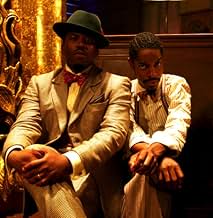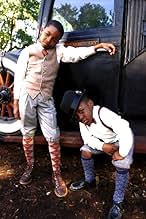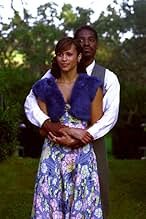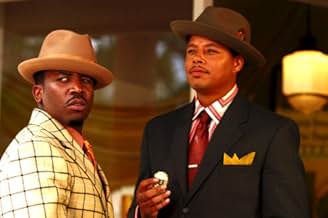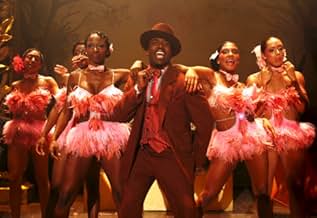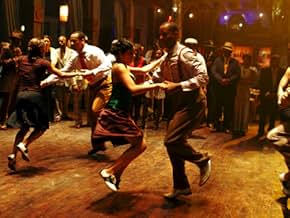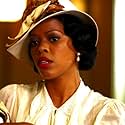IMDb-BEWERTUNG
6,2/10
5949
IHRE BEWERTUNG
Füge eine Handlung in deiner Sprache hinzuAt a sexy, sizzling nightclub, pianist Percival lives life by the rules, while Rooster, the club's flashy lead performer, struts his stuff on the stage. But all changes when greed, fame and ... Alles lesenAt a sexy, sizzling nightclub, pianist Percival lives life by the rules, while Rooster, the club's flashy lead performer, struts his stuff on the stage. But all changes when greed, fame and murder threaten to destroy them and the joint.At a sexy, sizzling nightclub, pianist Percival lives life by the rules, while Rooster, the club's flashy lead performer, struts his stuff on the stage. But all changes when greed, fame and murder threaten to destroy them and the joint.
- Auszeichnungen
- 7 Nominierungen insgesamt
André 3000
- Percival Jenkins
- (as André Benjamin)
Empfohlene Bewertungen
Considering the fact that this was a movie starring two rappers, I wasn't expecting much. I was very pleasantly surprised. Outkast aren't just any old rappers, as their fans could no doubt inform you. Most of their material, even though much of it is anachronistic for a film set in the 1930s, nonetheless, fit the movie quite well. Some of the pieces, of course, aren't rap. Indeed, Andre 3000 might as well no longer be called a rapper, considering the breadth of his material. The plot was surprisingly well thought out. It had a certain symmetry, yet was not completely predictable. I enjoyed the whole thing, and didn't have to close my eyes thinking "this is so stupid" all through the film.
Idlewild's greatest fault is that it is really uneven in tone. There were parts of it I really loved the prologue scenes, and some of the musical numbers, and then parts that just seemed to go splat on the screen. The tone of the beginning, very witty and hell-bent-for-leather, was great and seemed to be a great frame for a story about two hustlers - it seemed reminiscent of the winking, headlong tone of "The Sting" - and if the movie could have maintained that tone it might have been a tour de force. But other parts of the film were morose and uninteresting. Which leads us, unfortunately, to Andre 3000.
I understand making 3000 the Luke Skywalker and Big Boi the Han Solo, but Boi's character of Rooster was so much more interesting a character that whenever he wasn't on the screen the movie just went flat. It just seems to be a bad idea to have a main character who seemingly has no desire to attain his dreams he's kind of an anti-Joseph-Campbell hero and the other characters have to shove Percival toward his dreams like corralling a steer to slaughter. His mortician father is supposed to be his obstacle to the life Percival is meant to live, but it seems apathy is a more likely stumbling block; Percival looks more uncomfortable on stage than he does dressing bodies in the funeral home, instead of coming alive when he performs, which seems to be what the character requires.
I liked the music for the most part, but 3000 is the major failing here as well. His persona (it's hard to say that either he or Boi are acting since their characters hew so closely to the personas they have created for OutKast) is such the brooding artist that when the movie needs a shot of "I've finally made it!" razz ma tazz, he's not up to the task and the ending comes away like a lead balloon. I thought that for the most part they did a rather clever job blending the 30's music with the OutKast brand of the hippity hop, and my only complaint here is that Barber directed the music scenes like music videos and so the actors are obviously lip-synching, where a live performance captured for the film might have been exhilarating, here it comes off with the rote polished quality of any hip hop video with the actors seeming to walk through their performances rather than actually performing. The anachronistic quality of the songs isn't as jarring as I thought it might be, it's just the presentation of the music that takes you out of the time and place.
Otherwise, it's shot really well. There are some innovative visual effects that help guide the story, and the dances are staged with such vigor and bawdy realism that they have the gutbucket charm of the early "race" musicals.
The period look of the film is gorgeous; there's a whole lot of production value here - the sets and costumes notorious clotheshorses 3000 and Boi sport made me drool a little, and the ensemble cast is fantastic. It's Depression-Era Black South, but this particular vision seems to be a time and place little explored in cinema. With the exception of a touching scene late in the film in which Rooster, wayward after his long-suffering wife finally leaves him, encounters a religious woman literally at the end of the road, gives her some money and receives a Bible in return, the majority of the movie takes place among the black bourgeoisie and race or class is never an issue. Unfortunately, that touching scene is just an excuse to set up an unbelievably cliché and predictable scene later on when the Bible does what most cinematic Holy Books end up doing).
Overall, the plot is cliché at times and predictable more often than that, and gives the sense of a first-time writer/director finding his way, and there are some scenes that just don't make sense without spoilering, there's a glaring flaw that happens in the crucial first act that's both sloppy and stylistically cliché storytelling.
The biggest travesty, though is something that didn't hit me until I was on the way home. Ben Vereen is cast as 3000's mortician father, the supposed restraining influence. Toward the end of the movie they have a confrontation, which eventually leads to a reconciliation I can't possibly be giving anything away by saying that, or you've never seen a movie before. But on the way home it struck me - how do you have Ben Vereen in this movie and not write it into the script to have Ben Vereen DANCING?!? He's BEN VEREEN for crying out loud! Anyone who directs a musical and doesn't see the necessity of having the most talented cast member perform should have their DGA card revoked. All right, I got a little polemical there, but it seems a grievous oversight to overlook one of the film's greatest resources especially when you're supposed to be honoring the past, and this oversight is somehow indicative of the whole project (and now that I look at it, Patti LaBelle never sang in her cameo as the real Angel Davenport, either. Crispity Crunchity! All right, call the DGA, I'm serious, now.).
Idlewild is a movie that attempts some rather ambitious things; it's just a shame it achieved so few.
I understand making 3000 the Luke Skywalker and Big Boi the Han Solo, but Boi's character of Rooster was so much more interesting a character that whenever he wasn't on the screen the movie just went flat. It just seems to be a bad idea to have a main character who seemingly has no desire to attain his dreams he's kind of an anti-Joseph-Campbell hero and the other characters have to shove Percival toward his dreams like corralling a steer to slaughter. His mortician father is supposed to be his obstacle to the life Percival is meant to live, but it seems apathy is a more likely stumbling block; Percival looks more uncomfortable on stage than he does dressing bodies in the funeral home, instead of coming alive when he performs, which seems to be what the character requires.
I liked the music for the most part, but 3000 is the major failing here as well. His persona (it's hard to say that either he or Boi are acting since their characters hew so closely to the personas they have created for OutKast) is such the brooding artist that when the movie needs a shot of "I've finally made it!" razz ma tazz, he's not up to the task and the ending comes away like a lead balloon. I thought that for the most part they did a rather clever job blending the 30's music with the OutKast brand of the hippity hop, and my only complaint here is that Barber directed the music scenes like music videos and so the actors are obviously lip-synching, where a live performance captured for the film might have been exhilarating, here it comes off with the rote polished quality of any hip hop video with the actors seeming to walk through their performances rather than actually performing. The anachronistic quality of the songs isn't as jarring as I thought it might be, it's just the presentation of the music that takes you out of the time and place.
Otherwise, it's shot really well. There are some innovative visual effects that help guide the story, and the dances are staged with such vigor and bawdy realism that they have the gutbucket charm of the early "race" musicals.
The period look of the film is gorgeous; there's a whole lot of production value here - the sets and costumes notorious clotheshorses 3000 and Boi sport made me drool a little, and the ensemble cast is fantastic. It's Depression-Era Black South, but this particular vision seems to be a time and place little explored in cinema. With the exception of a touching scene late in the film in which Rooster, wayward after his long-suffering wife finally leaves him, encounters a religious woman literally at the end of the road, gives her some money and receives a Bible in return, the majority of the movie takes place among the black bourgeoisie and race or class is never an issue. Unfortunately, that touching scene is just an excuse to set up an unbelievably cliché and predictable scene later on when the Bible does what most cinematic Holy Books end up doing).
Overall, the plot is cliché at times and predictable more often than that, and gives the sense of a first-time writer/director finding his way, and there are some scenes that just don't make sense without spoilering, there's a glaring flaw that happens in the crucial first act that's both sloppy and stylistically cliché storytelling.
The biggest travesty, though is something that didn't hit me until I was on the way home. Ben Vereen is cast as 3000's mortician father, the supposed restraining influence. Toward the end of the movie they have a confrontation, which eventually leads to a reconciliation I can't possibly be giving anything away by saying that, or you've never seen a movie before. But on the way home it struck me - how do you have Ben Vereen in this movie and not write it into the script to have Ben Vereen DANCING?!? He's BEN VEREEN for crying out loud! Anyone who directs a musical and doesn't see the necessity of having the most talented cast member perform should have their DGA card revoked. All right, I got a little polemical there, but it seems a grievous oversight to overlook one of the film's greatest resources especially when you're supposed to be honoring the past, and this oversight is somehow indicative of the whole project (and now that I look at it, Patti LaBelle never sang in her cameo as the real Angel Davenport, either. Crispity Crunchity! All right, call the DGA, I'm serious, now.).
Idlewild is a movie that attempts some rather ambitious things; it's just a shame it achieved so few.
There is a very good reason that films in general are getting significantly worse in every quality. Why? Because in our time, when a film is made that is intelligent or creative in some significant way, it is usually ripped to pieces by critics and the general audience, teaching 'Hollywood' a lesson that they take to heart all too well.
Idlewild is a first rate musical, and feast for the eyes. Like 'Running Scared (2006)', the director believes that there is no reason a movie made in the 21st century should not benefit from all the options modern film technology offers (and no, I don't mean the visual rubbish that assaults the eyes in recent Tony Scott efforts). However, the state-of-the-art methods are used strictly in the service of 'old fashioned' film entertainment values, and this seemingly 'insults' the 'too cool for school' types, for whom enjoyment seems to be the last reason to pay to see a movie.
The actors are great, the acting is fine, and the production values are top notch. The story is a little clichéd, and as a result, the writer does seem to have cut-n-pasted from various familiar sources. However, this is a very minor criticism in a film that uses music as much as the spoken word to tell a story.
While the music is (mostly) contemporary, it was written with the aim of slotting into a (fantasy) period drama, and does so beautifully. While many of the performers may seem to have a 'rap' background, if this puts you off seeing Idlewild you are seriously misjudging the creativity and range of their talent.
Some may claim the film is a little 'tame', but a much better description is 'inclusive'. In other words, Idlewild really wants to reach and impress a wide audience, and it is a great pity that this doesn't seem to have happened yet.
Idlewild is a sexy sophisticated 'feelgood' musical- a vanity project for OutKast no doubt, but also a wonderful treat for those that value todays's rarest treasure, a new movie worth making the effort to see.
By the way Idlewild is NOT 'one long music video' (and I'm hard placed to see such comments as 'innocent' given the power of this lie to put people off seeing the movie). So forget any fear of 'opera' (like Evita where everything is sung) or MTV masquerading as a film. This is a HBO production, like Deadwood or the Sopranos, and that means quality first, especially the quality of the dramatic presentation. However, although Idlewild is an 'adult' film (thank heaven- the PG13 sludge is killing me), it lacks the extreme and explicit content of many of HBO's TV productions, so may be safely viewed by more 'sensitive' types.
If you watch a lot of films, and have no greater pleasure than finding an unexpected gem, give Idlewild a go. It really is 'the one that got away'.
Idlewild is a first rate musical, and feast for the eyes. Like 'Running Scared (2006)', the director believes that there is no reason a movie made in the 21st century should not benefit from all the options modern film technology offers (and no, I don't mean the visual rubbish that assaults the eyes in recent Tony Scott efforts). However, the state-of-the-art methods are used strictly in the service of 'old fashioned' film entertainment values, and this seemingly 'insults' the 'too cool for school' types, for whom enjoyment seems to be the last reason to pay to see a movie.
The actors are great, the acting is fine, and the production values are top notch. The story is a little clichéd, and as a result, the writer does seem to have cut-n-pasted from various familiar sources. However, this is a very minor criticism in a film that uses music as much as the spoken word to tell a story.
While the music is (mostly) contemporary, it was written with the aim of slotting into a (fantasy) period drama, and does so beautifully. While many of the performers may seem to have a 'rap' background, if this puts you off seeing Idlewild you are seriously misjudging the creativity and range of their talent.
Some may claim the film is a little 'tame', but a much better description is 'inclusive'. In other words, Idlewild really wants to reach and impress a wide audience, and it is a great pity that this doesn't seem to have happened yet.
Idlewild is a sexy sophisticated 'feelgood' musical- a vanity project for OutKast no doubt, but also a wonderful treat for those that value todays's rarest treasure, a new movie worth making the effort to see.
By the way Idlewild is NOT 'one long music video' (and I'm hard placed to see such comments as 'innocent' given the power of this lie to put people off seeing the movie). So forget any fear of 'opera' (like Evita where everything is sung) or MTV masquerading as a film. This is a HBO production, like Deadwood or the Sopranos, and that means quality first, especially the quality of the dramatic presentation. However, although Idlewild is an 'adult' film (thank heaven- the PG13 sludge is killing me), it lacks the extreme and explicit content of many of HBO's TV productions, so may be safely viewed by more 'sensitive' types.
If you watch a lot of films, and have no greater pleasure than finding an unexpected gem, give Idlewild a go. It really is 'the one that got away'.
What could Outkast do next to top the success of their double cd speakerboxx/love below? The Impresarios of Rap present Idlewilda hip hop love story set against the daily grind of running a juke joint during Prohibition in the town of Idlewild, GA. All the players were there, the piano player, the singer, and of course, the bootlegger. Whether it's a murder mystery, a gangsta tale, or a love story can be debated after you see it
just go see it.
Idlewild, a film by Bryan Barber starred Antoine Patton and Andre Benjamin. However, the music was done by Big Boi and Andre 3000. Outkast fans will get the difference. The rest will have to see to believe. Let us not forget, where there is a Big Boi and an Andre there will be a fair amount of quirky, a little bit of weird, a lot of imagination, and some stepping outside of the "speakerboxx".
The film had the musical stage appeal of Chicago with the black gangsta love of movies like Harlem Nights and Hoodlum. But unlike those Yankee tales, this story took place in the south before it became dirty or is it derty???? (where's my ebonics dictionary?) It speaks to a time and place accurately and without insult. It was clever and funny but also a little predictable. Which was ideal because the storyline is actually just scenery for all the incredible musical numbers and didn't need to be complicated. The characters had that two-dimensional feel reminiscent of the melodramas so popular in the 1930's. Idlewild rose to the challenge and very successfully captured the times, which is often a difficult task in a period piece.
Saying Outkast has an innovative approach to music is like saying that guy Picasso is alright with a paintbrush. The original score by Outkast blended the sound of the 30's, the jazz, the blues and the swing with rap and soulful rhythm and blues. It was kind of like a family reunion for home-grown syncopation. It was ingenious as well as inspired. The choreography only complimented the musical numbers giving the audience a complete juke joint experience.
The film also offered notable cameo appearances by Cicily Tyson, Ving Rhames, Bruce Bruce, Patty Labelle and the tease of Tony award winning Ben Vereen who doesn't dance. Also noteworthy is Macy Gray's performance as the falling diva Taffy.
If Rappers must make movies, they should all be so good.
Idlewild, a film by Bryan Barber starred Antoine Patton and Andre Benjamin. However, the music was done by Big Boi and Andre 3000. Outkast fans will get the difference. The rest will have to see to believe. Let us not forget, where there is a Big Boi and an Andre there will be a fair amount of quirky, a little bit of weird, a lot of imagination, and some stepping outside of the "speakerboxx".
The film had the musical stage appeal of Chicago with the black gangsta love of movies like Harlem Nights and Hoodlum. But unlike those Yankee tales, this story took place in the south before it became dirty or is it derty???? (where's my ebonics dictionary?) It speaks to a time and place accurately and without insult. It was clever and funny but also a little predictable. Which was ideal because the storyline is actually just scenery for all the incredible musical numbers and didn't need to be complicated. The characters had that two-dimensional feel reminiscent of the melodramas so popular in the 1930's. Idlewild rose to the challenge and very successfully captured the times, which is often a difficult task in a period piece.
Saying Outkast has an innovative approach to music is like saying that guy Picasso is alright with a paintbrush. The original score by Outkast blended the sound of the 30's, the jazz, the blues and the swing with rap and soulful rhythm and blues. It was kind of like a family reunion for home-grown syncopation. It was ingenious as well as inspired. The choreography only complimented the musical numbers giving the audience a complete juke joint experience.
The film also offered notable cameo appearances by Cicily Tyson, Ving Rhames, Bruce Bruce, Patty Labelle and the tease of Tony award winning Ben Vereen who doesn't dance. Also noteworthy is Macy Gray's performance as the falling diva Taffy.
If Rappers must make movies, they should all be so good.
I am guilty of elitism. I miss the days when Outkast's music was an obscurity. When their music was my music and not everybody's. When I finally did meet someone who knew the hook to "Elevators", we were instant best friends. But alas, Outkast gave up their dark, celestial style for ubiquitous jubilation.
While I'm willing to give up smoking for another ATliens or Aquemini,I can still appreciate the festivity that now ensues when they pop up on the radio. I'm sure Andre 3000 and Big Boi, err... Andre Benjamin and Antwan A. Patton, appreciate it even more. After all, the new vaudeville-bass quirks that they adopted have transformed them into one of the most adored groups today. It also garnered them this opulent production with HBO films.
Andre is Percival, a wholesome son of a mortician with dreams of making the Harlem music scene. Until then he plays piano before a ruthless crowd in Church. Church is hardly that, it is a Speakeasy with wild music and chichi showgirls.
Percival's best friend since childhood is Rooster (Antwan), a suave player from a family of gangsters. When his uncle is gunned down by the shifty eyed Terrence Howard, he inherits Church and it's debt with bootleggers. To get out of the red, he relies on his star performer Angel Davenport, played by the stunning Paula Patton. Angel and Percival develop the love jones.
There are tons of other catalyst characters. So many that it takes the humble narrator (Percival) ten minutes to introduce them all.
The town Idlewild is a place where Caucasians and subtlety do not exist. The only practicing minimalist is Percival and he is viewed as a recluse. He doesn't get talkative until he is alone with a cadaver.
Idlewild is visually titillating and toe-tapping fun, but a very simple story with elaborate storytelling. A period piece with CGI dance numbers, singing cuckoo clocks, and a talking flask. The music doesn't so much forward the story as tease it. When Rooster raps in Church, he paves the way for a Soul Train spectacle.
Bryan Barber acquired the director's chair through a strong relationship with Outkast. He is the man behind their most popular music videos. While he has an eye for pageantry, his script is too thin and unconstrained. For example, the narrator tells us that Rooster and Percival are best friends, but once we transcend their childhood prologue and reach adulthood, there are three instances of interaction. Once in the middle and twice at the end. I got the sense of two separate stories interconnected through habitat instead of plot points.
In so many ways this film is a metaphor for the current state of Outkast's career. While a movie based on the "old" Outkast would probably be a ghetto story in outer space, this one borders on nostalgia and women. Like their solo careers, Andre's character is always artistic and progressive. Big Boi's character arch is so small you could hop over it.
In the last two years there have been intermittent rumors of Outkast's breakup. Since they did not collaborate on their last album, nor the soundtrack to this film, they are together only in plastic packaging. Idlewild does nothing to squash these rumors.
Either way, there's not much I can do but throw my hands up in hey-ya, and rejoice in their gaiety like the rest of the world.
While I'm willing to give up smoking for another ATliens or Aquemini,I can still appreciate the festivity that now ensues when they pop up on the radio. I'm sure Andre 3000 and Big Boi, err... Andre Benjamin and Antwan A. Patton, appreciate it even more. After all, the new vaudeville-bass quirks that they adopted have transformed them into one of the most adored groups today. It also garnered them this opulent production with HBO films.
Andre is Percival, a wholesome son of a mortician with dreams of making the Harlem music scene. Until then he plays piano before a ruthless crowd in Church. Church is hardly that, it is a Speakeasy with wild music and chichi showgirls.
Percival's best friend since childhood is Rooster (Antwan), a suave player from a family of gangsters. When his uncle is gunned down by the shifty eyed Terrence Howard, he inherits Church and it's debt with bootleggers. To get out of the red, he relies on his star performer Angel Davenport, played by the stunning Paula Patton. Angel and Percival develop the love jones.
There are tons of other catalyst characters. So many that it takes the humble narrator (Percival) ten minutes to introduce them all.
The town Idlewild is a place where Caucasians and subtlety do not exist. The only practicing minimalist is Percival and he is viewed as a recluse. He doesn't get talkative until he is alone with a cadaver.
Idlewild is visually titillating and toe-tapping fun, but a very simple story with elaborate storytelling. A period piece with CGI dance numbers, singing cuckoo clocks, and a talking flask. The music doesn't so much forward the story as tease it. When Rooster raps in Church, he paves the way for a Soul Train spectacle.
Bryan Barber acquired the director's chair through a strong relationship with Outkast. He is the man behind their most popular music videos. While he has an eye for pageantry, his script is too thin and unconstrained. For example, the narrator tells us that Rooster and Percival are best friends, but once we transcend their childhood prologue and reach adulthood, there are three instances of interaction. Once in the middle and twice at the end. I got the sense of two separate stories interconnected through habitat instead of plot points.
In so many ways this film is a metaphor for the current state of Outkast's career. While a movie based on the "old" Outkast would probably be a ghetto story in outer space, this one borders on nostalgia and women. Like their solo careers, Andre's character is always artistic and progressive. Big Boi's character arch is so small you could hop over it.
In the last two years there have been intermittent rumors of Outkast's breakup. Since they did not collaborate on their last album, nor the soundtrack to this film, they are together only in plastic packaging. Idlewild does nothing to squash these rumors.
Either way, there's not much I can do but throw my hands up in hey-ya, and rejoice in their gaiety like the rest of the world.
Wusstest du schon
- WissenswertesThe film was originally written as a music video. The success of the album "Speakerboxxx/The Love Below" encouraged Outkast to expand it into a feature film. It was going to premiere on HBO, but was ultimately released in theaters.
- PatzerPercival states that he has been collecting records since the age of 8. For that to be possible, he would have to be 13 years old at the most, as the first record player was invented in 1930, 5 years before the movie takes place.
- Crazy CreditsThe credits play over a musical dance number by Percival
- VerbindungenEdited into Destination Planet Rock (2007)
- SoundtracksThe Nightmare
Written by Al Handler, Len Riley and Billy Meyves
Performed by Cab Calloway & His Orchestra
Courtesy of JSP Records
Top-Auswahl
Melde dich zum Bewerten an und greife auf die Watchlist für personalisierte Empfehlungen zu.
- How long is Idlewild?Powered by Alexa
Details
- Erscheinungsdatum
- Herkunftsland
- Sprache
- Auch bekannt als
- My Life in Idlewild
- Drehorte
- Orton Plantation - 9149 Orton Road SE, Winnabow, North Carolina, USA(interior and exterior of Jenkins Mortuary; interior of piano room)
- Produktionsfirmen
- Weitere beteiligte Unternehmen bei IMDbPro anzeigen
Box Office
- Budget
- 15.000.000 $ (geschätzt)
- Bruttoertrag in den USA und Kanada
- 12.571.185 $
- Eröffnungswochenende in den USA und in Kanada
- 5.745.780 $
- 27. Aug. 2006
- Weltweiter Bruttoertrag
- 12.643.027 $
- Laufzeit
- 2 Std. 1 Min.(121 min)
- Farbe
- Sound-Mix
- Seitenverhältnis
- 2.39 : 1
Zu dieser Seite beitragen
Bearbeitung vorschlagen oder fehlenden Inhalt hinzufügen







